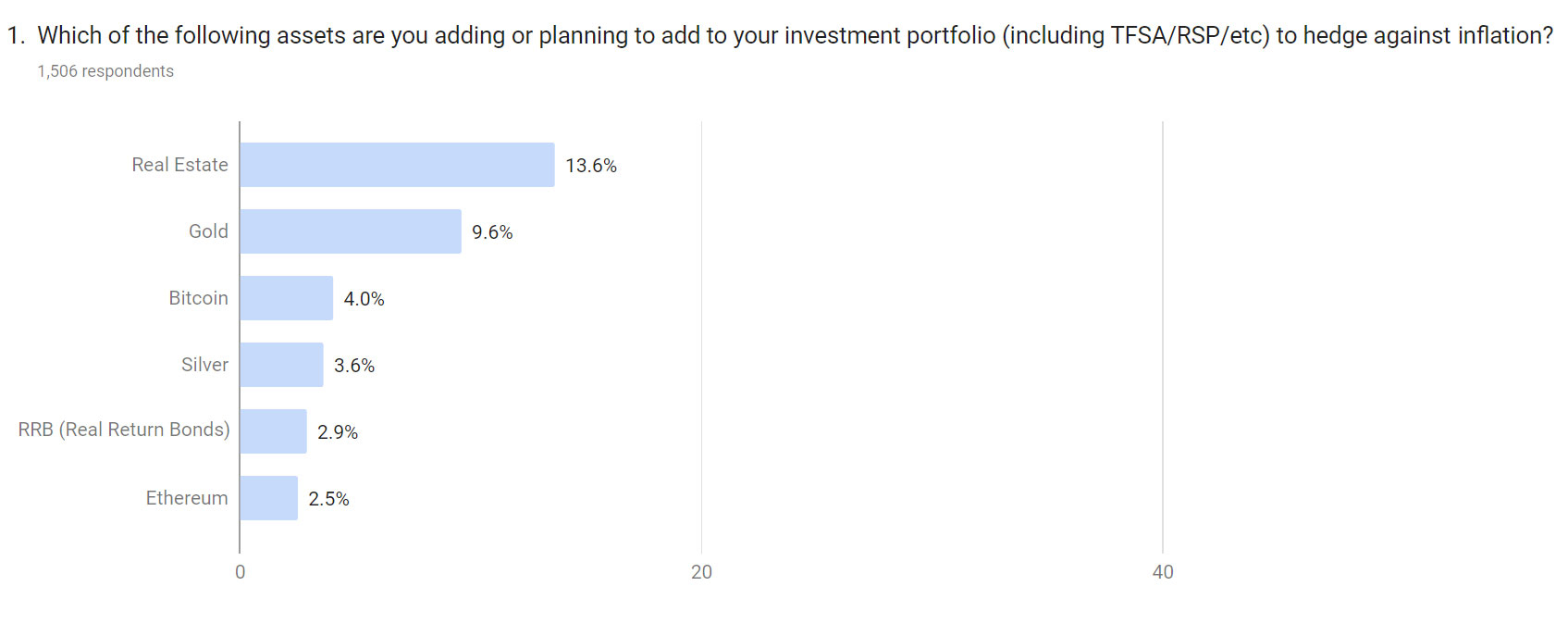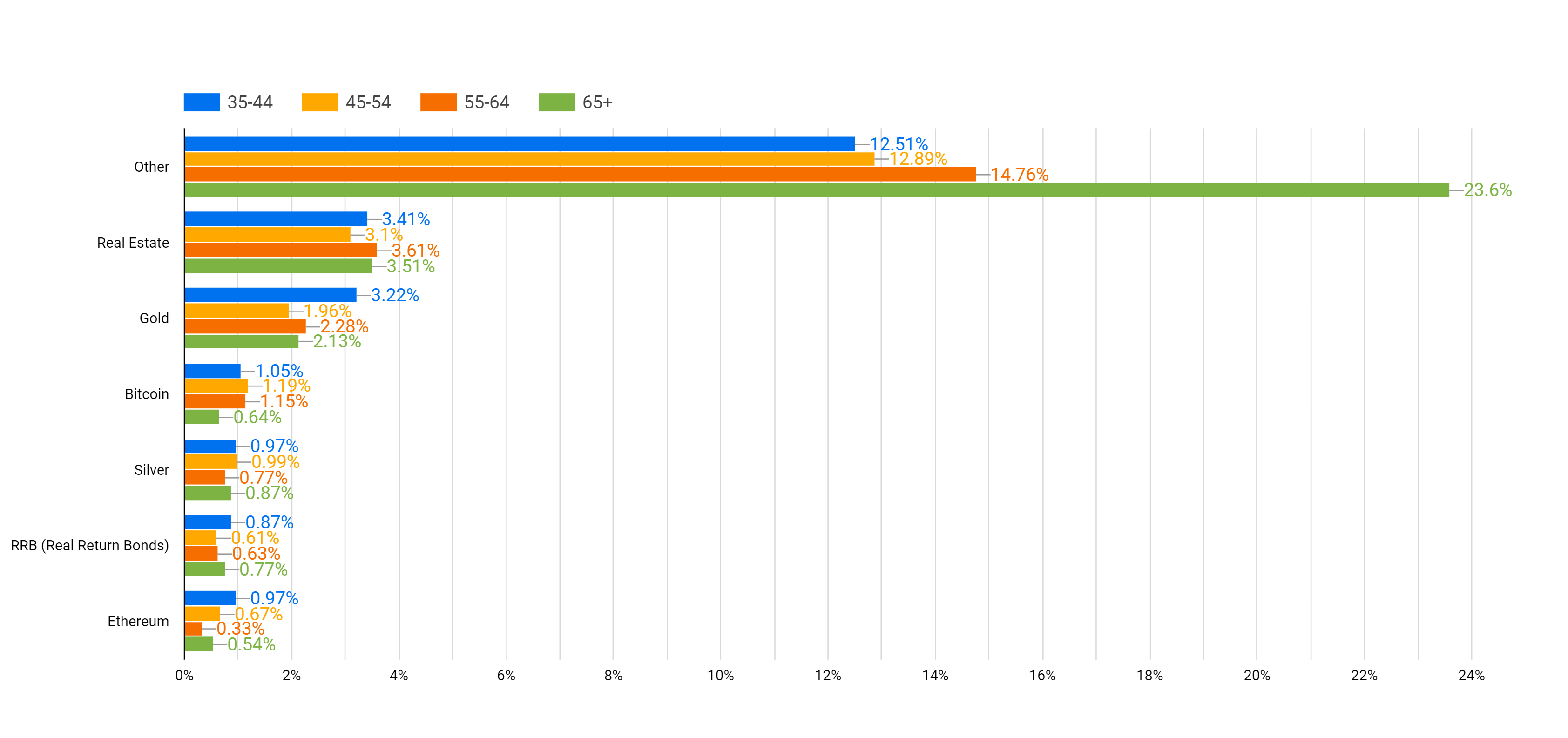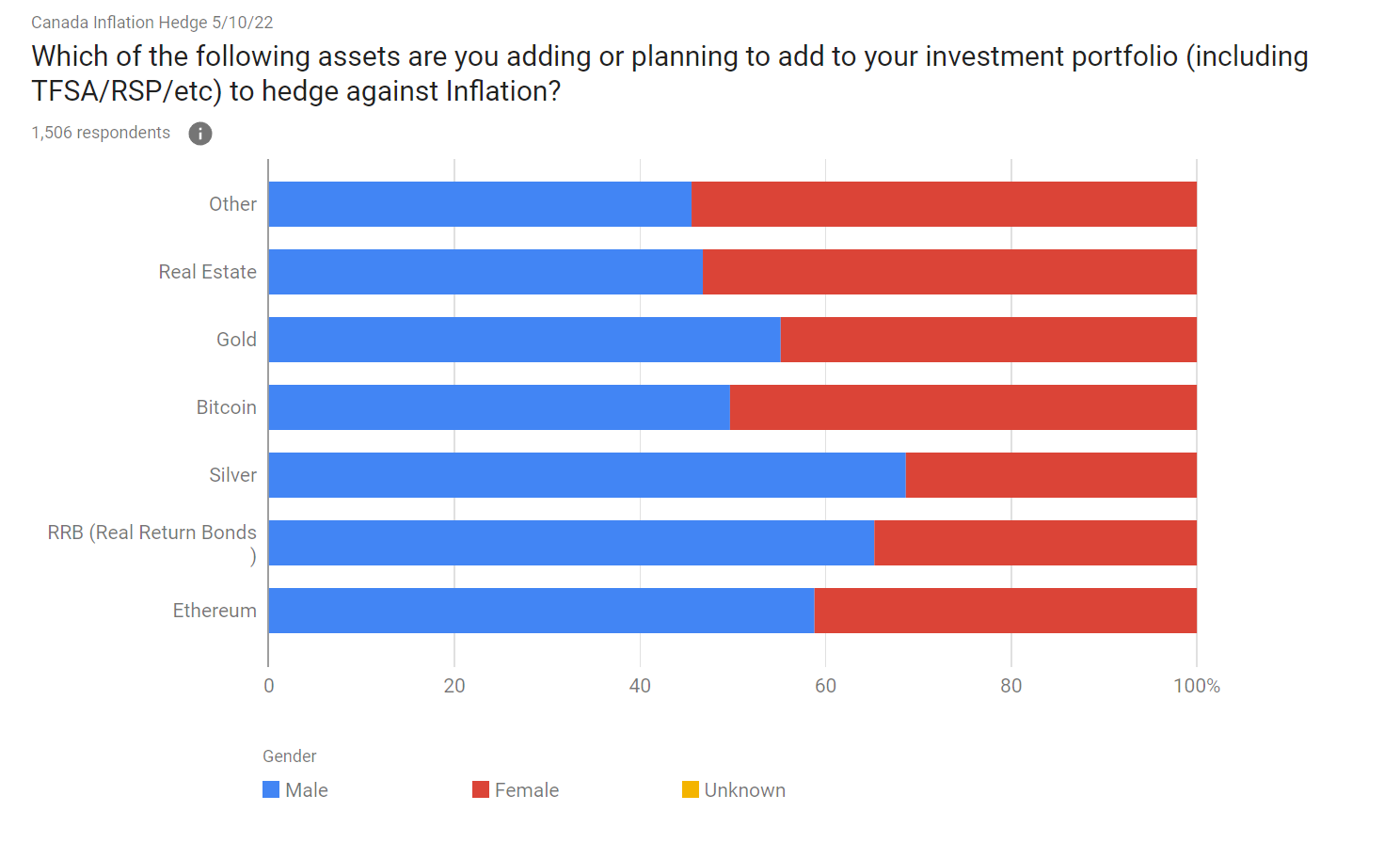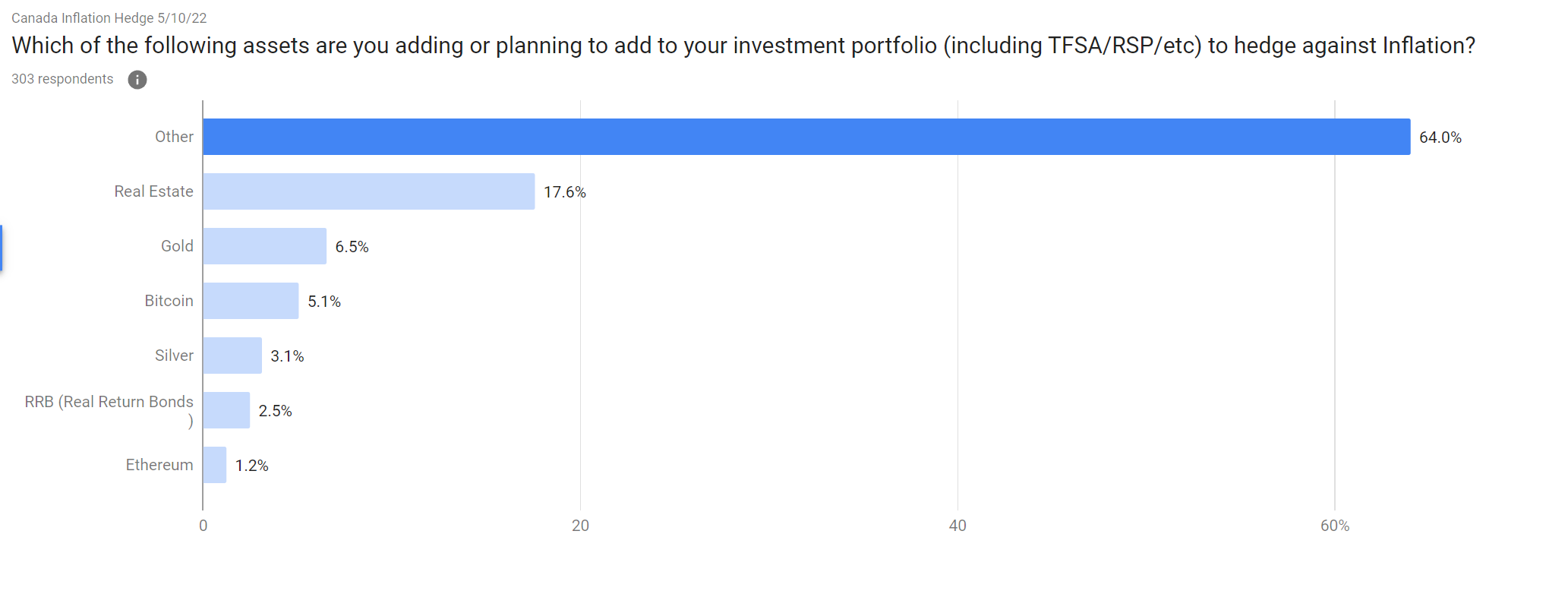Canadian Inflation Survey: Nearly 1-in-4 Canadians Looking to Real Estate or Gold to Hedge Against Rising Inflation
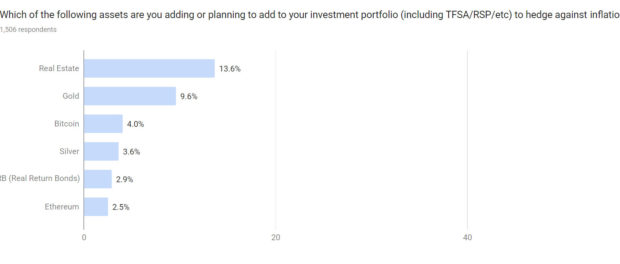
Key Takeaways:
- 13.6% of Canadians have supplemented their investment portfolios with real estate, or are planning to, in order to combat the effects of inflation
- Real estate is the most popular single inflation hedge in Canada at this time (13.6%), followed by gold (9.6%), cryptocurrency (6.5%), silver (3.5%) and RRBs (2.9%)
- Women are more likely to prefer real estate as an inflation hedge as compared to men, and are significantly less likely to invest in RRBs, silver, and gold
- Younger investors aged 35 to 44 are significantly more likely to invest in all asset types as compared to those aged 65+
- Nearly 1-in-4 Canadians (23.6%) are investing in either gold or real estate as an inflation hedging strategy; 26.8% are investing in precious metals (gold and silver) or real estate
- Atlantic Canadians are most likely to invest in gold (18.9%) out of any other region in the country
- British Columbians are most likely to invest in real estate (17.6%) out of any other region in the country
Figure 1. Source: Google Surveys
With the Consumer Price Index (CPI) at 6.8%, Canadians are now experiencing generationally high inflation levels. In fact, we haven’t seen inflation levels this high since 1991.
Given that the relative purchasing power of the dollar is diminishing at an accelerating rate, Canadians are looking to store their wealth in alternative assets to protect the value of their savings. However, a dearth of nationally representative survey data has prevented us from understanding exactly where Canadians’ savings are being diverted into.
According to a nationwide survey published by Gold RRSP on June 20th, 2022, nearly 1-in-7 Canadians have invested in real estate (or intend to) to combat inflation, 6.5% in major cryptocurrencies, and 13.2% in precious metals such as gold and silver.
Today, 85% of Canadians are concerned about inflation making everyday things less affordable, and 60% are worried about inflation’s impact on their ability to feed their families. Inflation is perhaps the most concerning economic issues facing Canadians today, yet little is understood about exactly how Canadians are responding to this unfolding crisis.
At least, not until now. In this article, we’ll discuss the data from this landmark survey and discuss how Canadian investors are reacting to generational inflation.
June 2022 Survey: Nearly 1 in 7 Canadians Turning to Real Estate Amid Inflation; 13.2% Moved into Precious Metals and 6.5% into Crypto
Gold RRSP recently published the results of a nationally representative survey that found that 13.6% of Canadians have either invested in real estate, or intend to soon, in order to mitigate the impact of inflation on their investment portfolio. The question was stated as follows:
“Which of the following assets are you adding or planning to add to your investment portfolio (including TFSA/RRSP, etc.) to hedge against inflation?”
The survey recruited 1,506 Canadians weighted by age and gender from each region of Canada, wherein each respondent was residing in Canada and was aged 35 or older.
Young Canadians between the ages of 18 and 34 were intentionally excluded from the population sample in order to target more mature investors who have more capital invested. This decision was made to prevent the survey results from being skewed by a demographic that is statistically less likely to invest their wealth.
The data displayed above (Fig. 1) indicate that, among the alternative asset classes listed, real estate (13.6%) is the most popular type of asset for Canadians looking to hedge against rising inflation. The second most popular asset type is precious metals, with a slightly smaller percentage (13.2%) investing in either gold or silver.
Inflation Hedging by Age Group
Figure 2. Source: Google Surveys
The chart above (Fig. 2) displays the differences across the age groups responding to the survey. The survey included four age categories:
- 35-44
- 45-54
- 55-64
- 65+
Generally, older respondents were far more likely to have selected “Other” than any other age category. This could be because retirement-aged investors may be more likely to opt for more conventional fixed-income asset types, such as Canada Savings Bonds, especially in a rising interest rate environment.
Most investment choices were not heavily skewed by age at a statistically significant level. However, gold was markedly preferred by the youngest age cohort (i.e., 35-44), who were 64% more likely to diversify with gold than their peers aged 45-44.
Inflation Hedging by Gender
Figure 3. Source: Google Surveys
The survey found interesting gender-based differences between men and women survey respondents. Among all asset types, silver, return return bonds, and Ethereum were the assets with the largest statistical differences by gender.
| Silver | Real Return Bonds | Ethereum | |
| Male | 68.6% | 65.2% | 58.8% |
| Female | 31.4% | 34.8% | 41.2% |
As displayed above, these three assets saw significantly gender-based disparities, but the reasons behind these differences are difficult to surmise. It may be that these differences arose out of happenstance or random chance.
Gender differences in Ethereum investing are unsurprising and rather expected, given that there are roughly twice as many men who invest in cryptocurrency than women. The disparities among the other assets, however, are less explicable.
In 2021, online users of the Reddit social forum organized an attempted “silver squeeze” which shot the price of the white metal to an 8-year high. This event drew significant mainstream press attention late January and early February of that year. Given that men account for 63.8% of Reddit’s user base, this may partially explain the disproportionately male preference for silver.
With respect to real return bonds (RRBs), it may be that men prefer the relatively low volatility of RRBs in relation to riskier assets such as real estate and Bitcoin.
Inflation Hedging by Region
Figure 4. Results limited to British Columbia. Source: Google Surveys
Geographical differences were largely insignificant after analyzing the survey results. Nonetheless, two interesting anomalies were present.
First, as depicted above (Fig. 4), respondents from British Columbia were much more likely to diversify with real estate than the national population (17.6%). This is likely due to the hot-red British Columbia housing market finally experiencing lower home sale prices. As the market cools and stabilizes, we can expect more buyers to enter the market.
Second, Atlantic Canadians (i.e., the Maritime provinces plus Newfoundland) are much more likely to invest in gold (18.9%) than the general population. This phenomenon may be at least partially explained by the region’s ongoing gold rush, as multiple gold exploration projects are underway in Newfoundland and the surrounding provinces.
Survey Methodology
The survey was conducted over a two-day period between May 10 and May 11, 2022, with a sample size of 1,506 adults. Respondents were geographically limited to Canada, were at least 35 years of age, and were users of the AdMob Network by Google Surveys.
The methodology made use of convenience sampling and including a nationally representative sample of men and women.
Study Details and RMSE Score
- Audience: Users of the AdMob Network and Google Surveys
- Method: Convenience
- Age: 35+
- Gender: All genders
- Location: Canada
- Language: English
- Frequency: Once
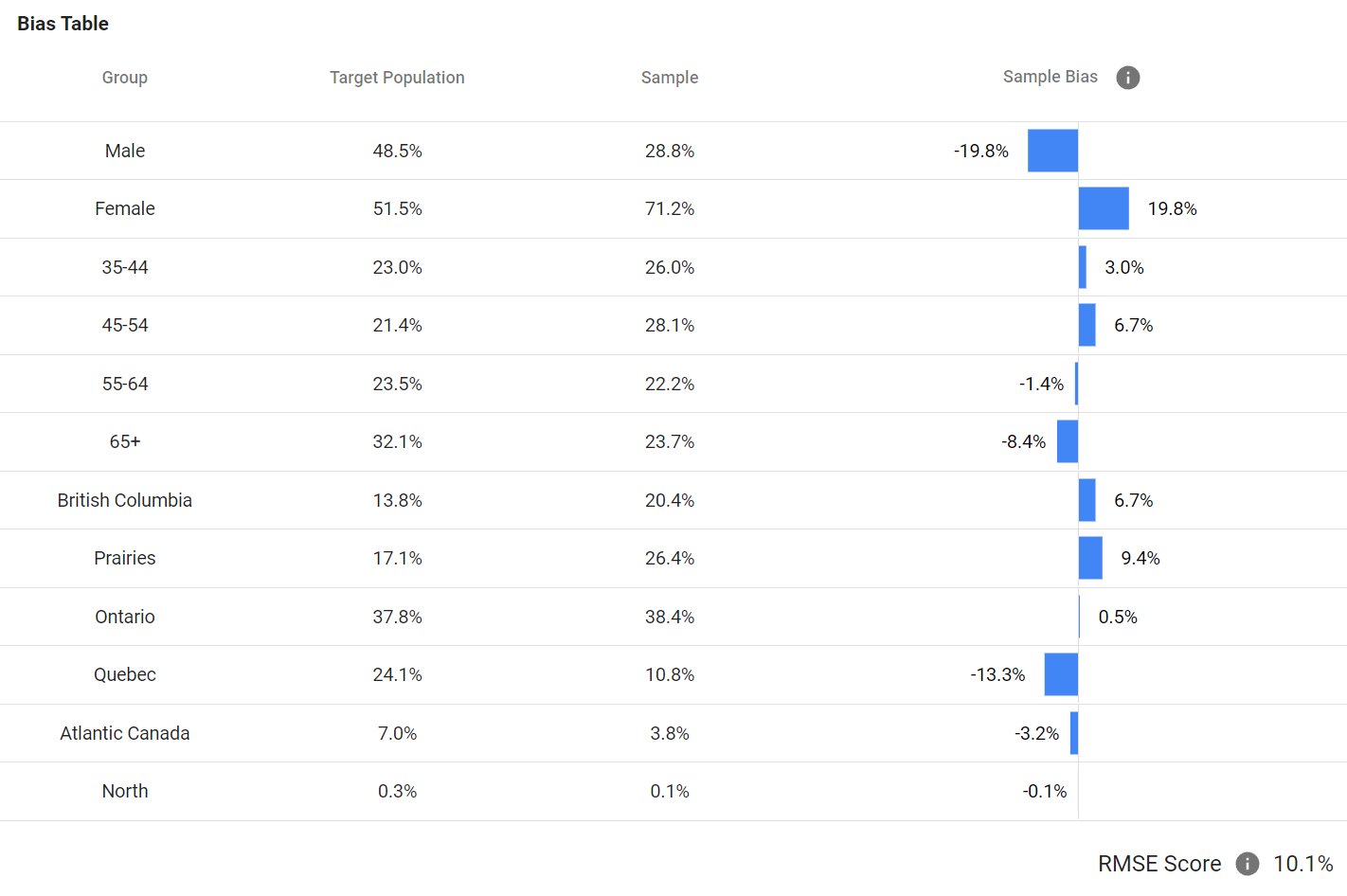 Root mean square error (RMSE) is a weighted average of the difference between the predicted population sample (CPS) and the actual sample (Google). The lower the RMSE score, the smaller the total sample bias.
Root mean square error (RMSE) is a weighted average of the difference between the predicted population sample (CPS) and the actual sample (Google). The lower the RMSE score, the smaller the total sample bias.
Discussion and Conclusions
Canadians are taking action against rising inflation in a wide variety of ways. Among the most popular hedging tools include real estate, precious metals, and cryptocurrencies. By contrast, Ethereum was the least popular among the assets listed in the survey.
Interestingly, these survey results demonstrate that most Canadians are turning their backs on traditional forms of inflation hedging (e.g., RRBs) in favor of alternative asset types that may pose a greater return. It may be that the inflationary period in which we might ourselves today will experience a degree of capital flight away from cash and into alternative assets as investors seek stable stores of value for their savings.
If you’re interested in diversifying with precious metals in order to limit the effects of inflation in your portfolio, Gold RRSP has a plethora of resources to help inform your decision.
Before consulting with a financial advisor, or opening a TFSA or RRSP, make sure you check the live spot price of gold or today’s silver price. These pricing resources can help you decide whether now is the right time to make an entry in the market.
Full Survey Report
For a more detailed look at the data included in this article, view the full survey report on Google Data Studio.

Will Your Retirement Weather the Next Financial Crisis?
Gold has been used as an inflation hedge and a way to preserve wealth for millennia. We partnered with Silver Gold Bull, Canada's top-rated gold company (with over 280,000 five-star reviews), to offer Canadians a low-cost and tax-advantaged way to buy gold and silver through an RRSP/TFSA or another retirement plan.
Request More Info
Website: www.SilverGoldBull.ca
Speak to an Expert: (877) 707-4707
Copyright 2023 Gold RRSP - Helping Canadians invest in physical bullion for retirement

